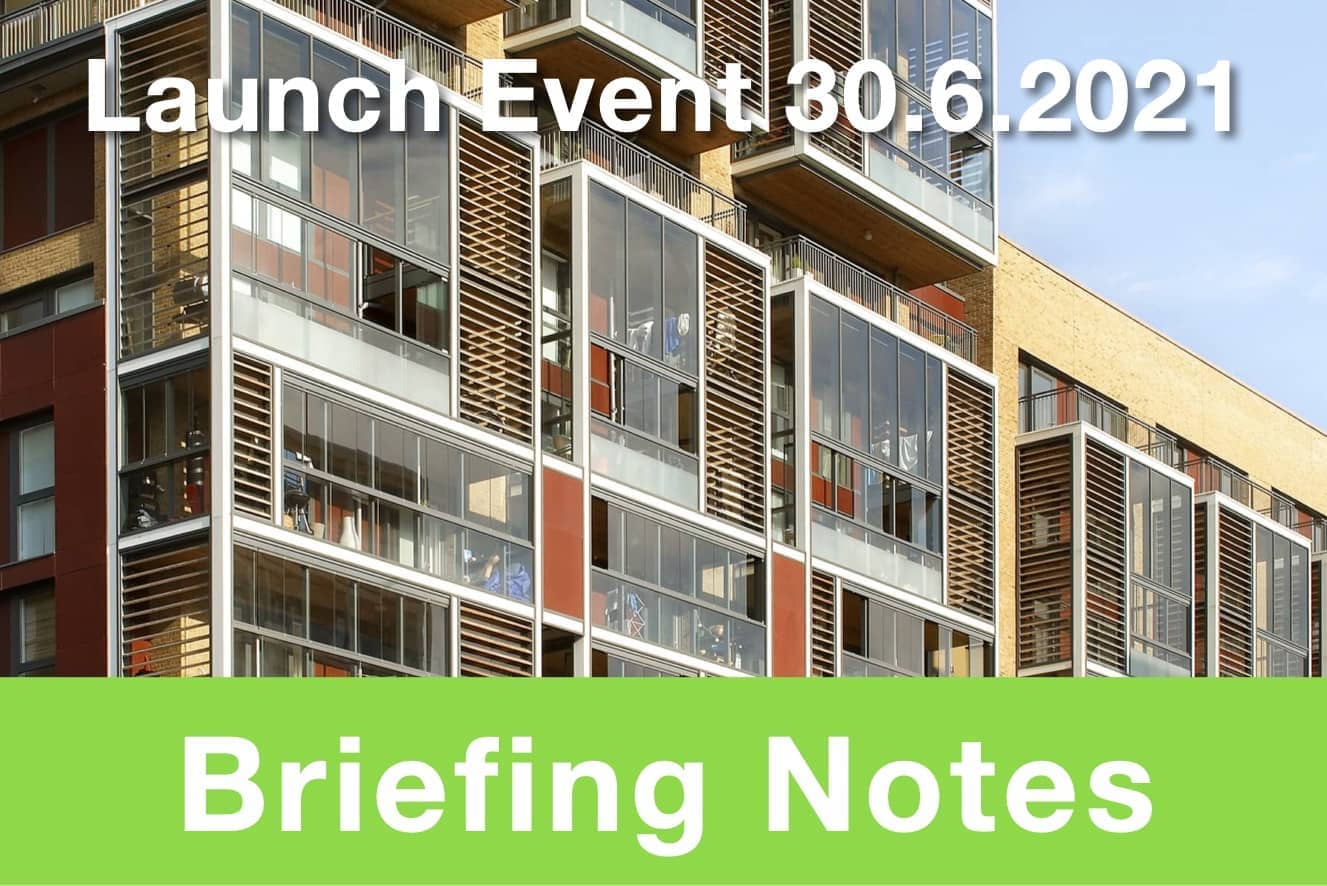
www.buildingsandcities.org/insights/news/urban-climate-resilience.html
Urban Climate Resilience: Tackling Microclimates and Dwelling Overheating

Join us for the launch of Briefing Notes - a new kind of article for practitioners - to discuss adaptation at two related urban scales. 30 June 2021, 12:00 - 13:30 BST
The design of our
cities, streets, open spaces and homes impacts on the local climate
(microclimate) as well as on the health of citizens. Compact urban form is often argued to be a
more sustainable approach, but can cause adverse consequences on local microclimates,
with localised cascading impacts on building energy demand for cooling/heating
and air quality. At the scale of the individual building, summertime
internal overheating in new and existing dwellings is widespread and
increasing, even in the UK's temperate climate.
There is an urgent need to solve the problem. Urban flats and small
dwellings are particularly affected, presenting new health risks to elderly and
vulnerable residents.
This event will feature the launch of two briefing papers on microclimates and overheating in temperate climates, bringing in panels of professionals from a variety of disciplines to consider the findings and implications for professional practice in the UK context. We will examine interacting consequences that arise from modern demands (e.g. increased density, increased floor area ratios, economic drivers), explore how resilience can be created and what this means for modifying existing cities, and showcase new knowledge and solutions. Respondents from government and practice are asked: How can we create and operationalise a resilient response? Which decisions take account of this? How can this be mainstreamed into professional practice?
The briefing papers:
Urban microclimate in temperate climates: a summary for practitioners by Rohinton Emmanuel
Summertime overheating in dwellings in temperate climates by Kevin Lomas
Speakers and Panellists
Richard Lorch, Editor in Chief, Buildings & Cities (Chair)
Gemma Holmes, Senior Analyst, Adaptation, UK Climate Change Committee
Rohinton Emmanuel, Director of the Centre for Energy and the Built Environment, Glasgow Caledonian University.
Kevin J. Lomas, School of Architecture, Building, and Civil Engineering, Loughborough University
Bhakti Depala, Development Liaison Manager, Dept of the Built Environment, City of London Corporation
Joanna Averley, Chief Planner, Ministry of Housing, Communities and Local Government (MHCLG)
Joe Baker, Head of Carbon Management, Haringey Council
Paul Ciniglio, Refurbishment Lead, National Energy Foundation
Briefing Notes
Briefing Notes are free, short articles (about 5 pages) that quickly and efficiently inform practitioners, clients and the public about the current state of knowledge on a particular topic and the implications this poses to them - opportunities and risks. These peer-reviewed articles address multiple levels of performance, the differences in its spatial scales, as well as lifecycle / long-term concerns. They will be tailored to the varied interests of the different actors.
Registration
Attendance is free, but advance registration is required. Registration and tickets: https://bit.ly/3iImDZJ
Time: Wednesday 30 June 2021 12:00 - 13:30 BST
Partners

This event is jointly hosted by Buildings & Cities and London Climate Change Partnership.
It is held as part of London Climate Action Week.
Latest Peer-Reviewed Journal Content
Energy sufficiency, space temperature and public policy
J Morley
Living labs: a systematic review of success parameters and outcomes
J M Müller
Towards a universal framework for heat pump monitoring at scale
J Crawley, L Domoney, A O’Donovan, J Wingfield, C Dinu, O Kinnane, P O’Sullivan
Living knowledge labs: creating community and inclusive nature-based solutions
J L Fernández-Pacheco Sáez, I Rasskin-Gutman, N Martín-Bermúdez, A Pérez-Del-Campo
A living lab approach to co-designing climate adaptation strategies
M K Barati & S Bankaru-Swamy
Mediation roles and ecologies within resilience-focused urban living labs
N Antaki, D Petrescu, M Schalk, E Brandao, D Calciu & V Marin
Negotiating expertise in Nepal’s post-earthquake disaster reconstruction
K Rankin, M Suji, B Pandey, J Baniya, D V Hirslund, B Limbu, N Rawal & S Shneiderman
Designing for pro-environmental behaviour change: the aspiration–reality gap
J Simpson & J Uttley
Lifetimes of demolished buildings in US and European cities
J Berglund-Brown, I Dobie, J Hewitt, C De Wolf & J Ochsendorf
Expanding the framework of urban living labs using grassroots methods
T Ahmed, I Delsante & L Migliavacca
Youth engagement in urban living labs: tools, methods and pedagogies
N Charalambous, C Panayi, C Mady, T Augustinčić & D Berc
Co-creating urban transformation: a stakeholder analysis for Germany’s heat transition
P Heger, C Bieber, M Hendawy & A Shooshtari
Placemaking living lab: creating resilient social and spatial infrastructures
M Dodd, N Madabhushi & R Lees
Church pipe organs: historical tuning records as indoor environmental evidence
B Bingley, A Knight & Y Xing
A framework for 1.5°C-aligned GHG budgets in architecture
G Betti, I Spaar, D Bachmann, A Jerosch-Herold, E Kühner, R Yang, K Avhad & S Sinning
Net zero retrofit of the building stock [editorial]
D Godoy-Shimizu & P Steadman
Co-learning in living labs: nurturing civic agency and resilience
A Belfield
The importance of multi-roles and code-switching in living labs
H Noller & A Tarik
Researchers’ shifting roles in living labs for knowledge co-production
C-C Dobre & G Faldi
Increasing civic resilience in urban living labs: city authorities’ roles
E Alatalo, M Laine & M Kyrönviita
Co-curation as civic practice in community engagement
Z Li, M Sunikka-Blank, R Purohit & F Samuel
Preserving buildings: emission reductions from circular economy strategies in Austria
N Alaux, V Kulmer, J Vogel & A Passer
Urban living labs: relationality between institutions and local circularity
P Palo, M Adelfio, J Lundin & E Brandão
Living labs: epistemic modelling, temporariness and land value
J Clossick, T Khonsari & U Steven
Co-creating interventions to prevent mosquito-borne disease transmission in hospitals
O Sloan Wood, E Lupenza, D M Agnello, J B Knudsen, M Msellem, K L Schiøler & F Saleh
Circularity at the neighbourhood scale: co-creative living lab lessons
J Honsa, A Versele, T Van de Kerckhove & C Piccardo
Positive energy districts and energy communities: how living labs create value
E Malakhatka, O Shafqat, A Sandoff & L Thuvander
Built environment governance and professionalism: the end of laissez-faire (again)
S Foxell
Co-creating justice in housing energy transitions through energy living labs
D Ricci, C Leiwakabessy, S van Wieringen, P de Koning & T Konstantinou
HVAC characterisation of existing Canadian buildings for decarbonisation retrofit identification
J Adebisi & J J McArthur
Simulation and the building performance gap [editorial]
M Donn
Developing criteria for effective building-sector commitments in nationally determined contributions
P Graham, K McFarlane & M Taheri
Join Our Community

The most important part of any journal is our people – readers, authors, reviewers, editorial board members and editors. You are cordially invited to join our community by joining our mailing list. We send out occasional emails about the journal – calls for papers, special issues, events and more.
We will not share your email with third parties. Read more



Latest Commentaries
COP30 Report
Matti Kuittinen (Aalto University) reflects on his experience of attending the 2025 UN Conference of the Parties in Belém, Brazil. The roadmaps and commitments failed to deliver the objectives of the 2025 Paris Agreement. However, 2 countries - Japan and Senegal - announced they are creating roadmaps to decarbonise their buildings. An international group of government ministers put housing on the agenda - specifying the need for reduced carbon and energy use along with affordability, quality and climate resilience.
Building-Related Research: New Context, New Challenges
Raymond J. Cole (University of British Columbia) reflects on the key challenges raised in the 34 commissioned essays for Buildings & Cities 5th anniversary. Not only are key research issues identified, but the consequences of changing contexts for conducting research and tailoring its influence on society are highlighted as key areas of action.